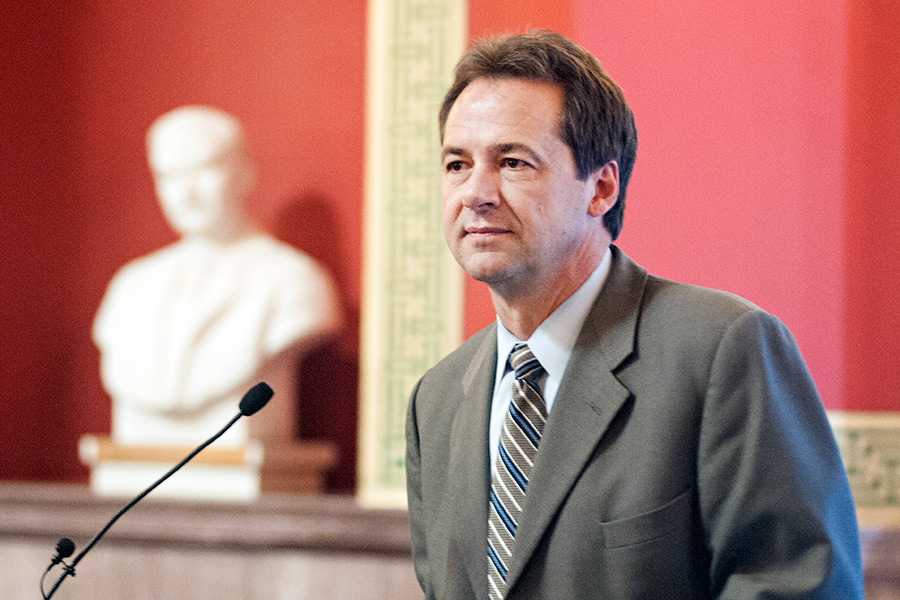Governor Urges Congress Not to Repeal Obamacare Without a Replacement
Bullock’s letter touts Montana’s bipartisan efforts to cooperate on Medicaid expansion as changes to Affordable Care Act loom in a Trump presidency
By Molly Priddy
On Dec. 19, Montana Gov. Steve Bullock sent a letter to Republican leadership in the U.S. House of Representatives, asking for national lawmakers to have a plan in place before they take action on repealing the Affordable Care Act, also known as Obamacare.
The governor, a Democrat, wrote the letter to U.S. House Majority Leader Kevin McCarthy, with copies sent to other congressional leaders, including Montana’s delegation and U.S. Senate Majority Leader Mitch McConnell. In it, Bullock thanked McCarthy for the chance to provide input on the future of health care law in America.
President-elect Donald Trump has promised to repeal Obamacare in the first 100 days of his presidency, a move Republicans in Congress have unsuccessfully attempted at least 60 times since the ACA was signed into law in 2012. With Trump’s inauguration weeks away and GOP majorities in both chambers of Congress, changes to the health care law seem probable.
How that will look is still uncertain, and Bullock said lawmakers should have a new plan in place before removing the ACA. Nearly 6.4 million Americans have insurance policies through Obamacare’s federal exchange, with 37,810 Montanans among them.
“Congress should not rip healthcare away from tens of thousands of Montanans and millions of Americans without first presenting a real and viable alternative that protects patients and provides a foundation for states, healthcare providers, and insurers to responsibly plan for the future,” Bullock wrote.
The governor then touted the bipartisan effort it took for the 2015 Montana Legislature to pass the Health and Economic Livelihood Partnership (HELP) Act, a compromise bill that brought moderate Republicans together with Democrats in the Legislature to pass a form of Medicaid expansion. The HELP Act highlights personal responsibility in health care through copays and premiums, and uses a private business for the provider network and claims processing. Participants also have access to programs for workforce development.
Bullock wrote that since signing the HELP Act into law, the uninsured rate in Montana dropped from 20 percent in 2013 to roughly 7 percent in 2016. He also noted that 31 states, including 14 with Republican governors, have expanded Medicaid to low-income residents based on the ACA.
Expanding Medicaid was a particularly acrimonious process for state lawmakers, one that may present itself again at the upcoming session starting in January. Montana Senate President Scott Sales, R-Bozeman, said he agreed with the basic premise of Bullock’s letter — that Congress should have another plan in place before repealing the ACA — but disagreed with the governor’s assessment of Obamacare in Montana.
“I think there’s a lot of political posturing in the letter, referring to Obamacare in glowing terms,” Sales said. “It doesn’t face the hardcore facts that many of my constituents are being priced out of the health care system.”
In October, it was announced that 2017 premiums through Obamacare were set to increase by an average of 22 percent, which led some insurers to pull out of the exchange. Sales said that overall the ACA has been a net negative for Montana, but also that he doesn’t think Congress should merely repeal it as soon as they can.
“It would add chaos to chaos,” Sales said. “I have every confidence that the Republicans are going to have a plan that has some sort of solution to the problem. There needs to be something else; I just don’t know the form that’s going to take. I hope it has more free-market principles than this (law).”
Since there’s no certainty what will happen to the law after Trump is inaugurated on Jan. 20, Sales said state lawmakers hope to have a quick session and finish early to save a few legislative days to work on potential federal changes to the law and how they affect the state.
“I’m confident that we’re going to have changes to Obamacare, and I think it will have impacts on the state,” Sales said.
State Speaker of the House Austin Knudsen, R-Culbertson, was less selective about when the law should be repealed, just that it should happen soon after the inauguration. Knudsen said the law would likely end up phased out over a few years, and the details would work themselves out in that time.
“My thoughts on that are I think it’s going to take care of itself,” Knudsen said. “Anything Congress does, they’re not going to pull the plug on this thing tomorrow.”
There are worries among some Republicans about Trump potentially changing how Medicaid is financed, by giving states money through block grants, he said. But Knudsen said the state Legislature will likely leave alone Medicaid funding unless Congress makes decisions while lawmakers are in session. Any changes state Republicans wanted to make to Medicaid, even if they gained ground in the Legislature, would face the pen of the Democrat governor.
“Even if something got going, there is zero chance of getting it signed by the governor,” Knudsen said.
In his letter, Bullock emphasized that Republicans in Congress have had plenty of time to come up with a responsible approach to changing the law.
“Opponents of the Affordable Care Act have had six years to design fixes, replacements, and alternatives,” Bullock wrote. “Repealing (the ACA) without an immediate and transparent plan for the future would be grossly irresponsible, throwing our entire healthcare system into chaos and leaving millions of Americans uncertain about their healthcare future.”